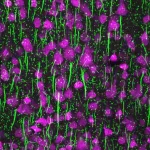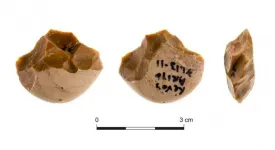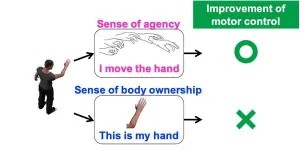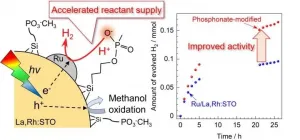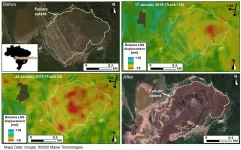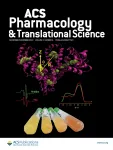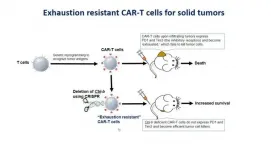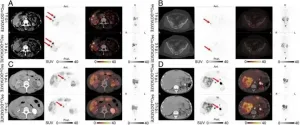Saturn's tilt caused by its moons
2021-01-21
(Press-News.org) Rather like David versus Goliath, it appears that Saturn's tilt may in fact be caused by its moons. This is the conclusion of recent work carried out by scientists from the CNRS, Sorbonne University and the University of Pisa, which shows that the current tilt of Saturn's rotation axis is caused by the migration of its satellites, and especially by that of its largest moon, Titan.
Recent observations have shown that Titan and the other moons are gradually moving away from Saturn much faster than astronomers had previously estimated. By incorporating this increased migration rate into their calculations, the researchers concluded that this process affects the inclination of Saturn's rotation axis: as its satellites move further away, the planet tilts more and more.
The decisive event that tilted Saturn is thought to have occurred relatively recently. For over three billion years after its formation, Saturn's rotation axis remained only slightly tilted. It was only roughly a billion years ago that the gradual motion of its satellites triggered a resonance phenomenon that continues today: Saturn's axis interacted with the path of the planet Neptune and gradually tilted until it reached the inclination of 27° observed today.
These findings call into question previous scenarios. Astronomers were already in agreement about the existence of this resonance. However, they believed that it had occurred very early on, over four billion years ago, due to a change in Neptune's orbit. Since that time, Saturn's axis was thought to have been stable. In fact, Saturn's axis is still tilting, and what we see today is merely a transitional stage in this shift. Over the next few billion years, the inclination of Saturn's axis could more than double.
The research team had already reached similar conclusions about the planet Jupiter*, which is expected to undergo comparable tilting due to the migration of its four main moons and to resonance with the orbit of Uranus: over the next five billion years, the inclination of Jupiter's axis could increase from 3° to more than 30°.
INFORMATION:
*- https://www.aanda.org/articles/aa/full_html/2020/08/aa38432-20/aa38432-20.html
[Attachments] See images for this press release:
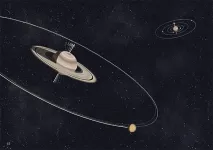
ELSE PRESS RELEASES FROM THIS DATE:
2021-01-21
To process information in our brains, nerve cells produce brief electrical impulses, called action potentials, triggered from one highly specialized region. Research from the Netherlands Institute for Neuroscience, together with researchers from Heidelberg University and the University of Göttingen in Germany, now show that the electrical trigger sites surprisingly change with experience; they are either becoming smaller with increasing number of experiences and, vice versa, they grow larger when less input arrives in the brain. The results were published in Nature Communications.
Exploring the environment
Rodents learn about their environment by moving their highly sensitive whiskers, with which they touch ...
2021-01-21
Researchers from the Sonia and Marco Nadler Institute of Archaeology at Tel Aviv University unraveled the function of flint tools known as 'chopping tools', found at the prehistoric site of Revadim, east of Ashdod. Applying advanced research methods, they examined use-wear traces on 53 chopping tools, as well as organic residues found on some of the tools. They also made and used replicas of the tools, with methods of experimental archaeology. The researchers concluded that tools of this type, found at numerous sites in Africa, Europe and Asia, were used by prehistoric humans at Revadim to neatly break open bones of medium-size animals such as fallow deer, gazelles and ...
2021-01-21
UV-radiation can affect hormone levels of postmenopausal women negatively and this may contribute to several health issues.
The concentration of oestrogens in the blood affects a woman's health in many ways. For example, oestrogens contribute to a strong bone structure and help wounds heal more quickly:
"When a woman reaches menopause, we see the levels of oestrogens decline and an increase of other hormones, called gonadotropins", says Kai Triebner at the University of Bergen.
For several years, he has studied the hormonal balance of women in relation to menopause: What effects changing hormone levels ...
2021-01-21
With Japan's society rapidly aging, there has been a sharp increase in patients who experience motor dysfunctions. Rehabilitation is key to overcoming such ailments.
A researcher from Tohoku University has developed a new virtual reality (VR) based method that can benefit rehabilitation and sports training by increasing bodily awareness and?improving motor control.
His research was published in the Journal Scientific Report.
Not only can we see and touch our body, but we can sense it too. Our body is constantly firing off information to our brains that tell us where our limbs are in real-time. This process makes us aware of our body and gives us ownership over it. Meanwhile, our ability to control ...
2021-01-21
Water splitting research for solar hydrogen production has focused on physical processes inside the semiconductor, such as light absorption, charge separation, and chemical processes on the surface that are highly complex and rely on the development of new materials. However, processes inside the solution had yet to be thoroughly explored.
One recent approach to improve photocatalytic hydrogen production was proposed by loading phosphonate groups on the surface of the visible-light-responsive photocatalyst lanthanum and rhodium-doped strontium titanate (La,Rh:STO) with a silane coupling agent. The phosphonate functional group functions as a mediator of proton supply (i.e., promotes the supply of reactants) and improves hydrogen production activity.
There have been ...
2021-01-21
Just a few millimetres thick, articular cartilage plays a crucial role in our musculoskeletal system, since it is responsible for smooth (in the truest sense of the word) movement. However, the downside of its particular structure is that even minor injuries do not regenerate. Timely treatment of cartilage damage is therefore essential. Biomaterials are often used to support the cells, their distribution and protection. In most cases, this treatment significantly improves the patient's clinical symptoms but fails to fully restore the cartilage to its original state. The working group led by Sylvia Nürnberger (MedUni Vienna's Department of Orthopedics and Trauma Surgery) ...
2021-01-21
One of Brazil's worst environmental disasters - a dam collapse that also killed more than 200 people - could have been foreseen with the right monitoring technology, according to a new study by the University of Nottingham and Durham University.
The high-profile catastrophe took place on 25 January 2019 at a tailings dam near the Córrego do Feijão iron ore mine, close to the town of Brumadinho, in Minas Gerais state, south-east Brazil.
When the dam collapsed, it caused a torrent of sludge to cover surrounding land; taking lives, destroying homes and livelihoods and polluting rivers with toxic material.
Owned by Vale, Brazil's largest mining company, the tailings dam was ...
2021-01-21
A protein found commonly in human blood might help with the detection of hard-to-diagnose pancreatic tumours. Researchers at Martin Luther University Halle-Wittenberg (MLU), the Alfried Krupp Hospital in Essen and the University of Witten/Herdecke have developed approach using the protein's structure and its function as a proxy for this. In a first study in ACS Pharmacology & Translational Science, the team shows how its method can also be used to differentiate between benign and malignant tumours.
Pancreatic cancer is particularly insidious: "It remains asymptomatic for a long time, which leads to very late diagnoses and therefore a low chance of treating it successfully," says Dr Marcos Gelos from the Alfried Krupp Hospital and Witten/Herdecke University who ...
2021-01-21
DALLAS - Jan. 19, 2021 - Eliminating a single gene can turn exhausted cancer-fighting immune cells known as CD8+ T cells back into refreshed soldiers that can continue to battle malignant tumors, a new study led by UT Southwestern researchers suggests. The findings, published online this week in the Journal for Immunotherapy of Cancer, could offer a new way to harness the body's immune system to attack cancers.
In 2017, the Food and Drug Administration approved treatments involving chimeric antigen receptor T (CAR-T) cells, which consist of immune cells known as T cells that ...
2021-01-21
Reston, Virginia--The imaging time window of 64Cu-DOTATATE positron emission tomography/computed tomography (PET/CT) for patients with neuroendocrine neoplasms can be expanded from one hour to three hours post-injection, according to new research published in the January issue of the Journal of Nuclear Medicine. In a head-to-head comparison of scans performed at the two time intervals, there were no significant differences in the number of lesions detected, and tumor-to-normal tissue ratios remained high in all key organs.
Previous research has demonstrated that 64Cu-DOTATATE PET imaging at one hour post-injection provides excellent lesion detection in patients with neuroendocrine neoplasms. "Given the long half-life and excellent image resolution of 64Cu-DOTATATE, ...
LAST 30 PRESS RELEASES:
[Press-News.org] Saturn's tilt caused by its moons

